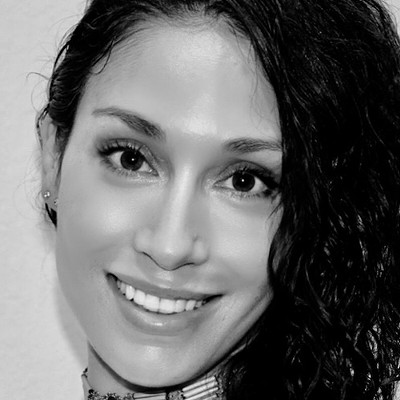At 32 East in Delray Beach, executive chef Nick Morfogen is known for using seasonally fresh French Périgord black truffles and white Italian Alba truffles whenever they're available. Unlike a majority of South Florida kitchens that use truffle-infused oils (some even use synthetic versions, gasp!) in their so-called truffle dishes, Morfogen uses only the real deal -- a necessary step when preparing his haute cuisine.
To purchase them fresh, Morfogen says he uses two purveyors: one based in Washington state, another out of New York. Which one, he said, depends on the truffle and the price. He will pay around $1,000 a pound for French Périgord and has been known to drop close to $3,000 on a pound of white
Alba truffles, a cost that registers to around $60 to $75 (or higher) per plate. And that's serving the dish at cost, added Morfogen.
What's the alternative? Short of planting a tuber-infested oak tree of his own, paying a few hundred for an ounce of flash-frozen imported truffles or buying American-grown truffles, not much.
"And I won't buy [American-grown] truffles," said Morfogen. "They don't taste very good, and I won't do it."
But what if 32 East's chef had the chance to use fresh, local, American-grown French Périgord or Italian truffles to shave over a plate of pasta or grate into fresh-whipped mashed potatoes?
It's a question Arizona's Aaron and Liz Eckburg are posing not just to chefs like Morfogen but to foodies everywhere. If truffles are your passion, it's their hope you'll visit the Dutchman's Truffiere Indiegogo site to help them found the very first Arizona-based French Périgord truffle orchard, one the Eckburgs believe can become a commercially viable farm in years to come.
There's just one thing standing in their way: a whole lotta dough. The Eckburgs estimate it will cost more than $3 million to get the project started and have opened their venture to crowd funding to source the necessary cash. While it's not impossible (the largest crowd-funded project to date closed mid-March and brought in $3.3 million), the Dutchman's truffiere would hold the title as the largest crowd-funded project if it manages to raise the $3.5 million to purchase equipment, land, and trees needed to establish and maintain the truffiere over the next decade before initial crops can be harvested.
Although Arizona is hardly the place you'd expect to find Périgord truffles, according to the Eckburgs, a particular area among the state's three wine-growing regions is considered by some to be the perfect location to plant the prospective orchard.
"We have a confluence of unique circumstances here in Arizona," said Aaron, cofounder of Dutchman's Truffiere. "Climate and soil conditions are both virtually ideal for growing Périgord truffles."
The Eckburgs also believe these same conditions will support the growth of the rare white Alba truffles harvested during the summer months in Italy, a mushroom so rare and perishable that most Americans will never see one fresh in the U.S., added Liz.
Using methods associated with France's commercial truffle industry, the couple is working with some of the people who helped produce Perigord truffles in New Zealand in just under six years. Their project will begin by planting ten acres of Holm Oak, or a total of 1,200 to 2,500 trees inoculated with the Périgord truffle spore, also known as tuber malensporum. The Eckburgs also hope to plant several trees inoculated with tuber magnatum, or white Alba truffle spores. Once planted, it could take up to ten years before the first crop can be harvested -- a crop the Eckburgs hope will be as fresh as those you'll find at the local, back-alley markets in France.
With an estimated yield of 30 to 100 pounds of truffle per acre, the Eckburg's goal is to make these coveted European truffles available to the American foodie for a fraction of the current cost. It's a promising vision, especially when European truffles -- most shipped from France and Italy -- are available only seasonally and subject to a heavy tariff coming into the U.S.
Dutchman's Truffiere won't be the first American-grown truffles, however. Truffieres have been attempted in California, Oregon, North Carolina, Tennessee, and Texas with hundreds of small orchards -- most two acres or less. Of them, three have successfully produced Périgord but on a much smaller scale. According to the Eckburgs, only two have come close to culling a significant commercial crop available to U.S. consumers -- one 1,000-tree truffiere in Tennessee and one in North Carolina.
Dutchman's, however, would be the first truffle orchard in the Southwest. If the project is successful, the truffiere may also be the first eco-friendly, commercially viable truffle orchard stateside, an important factor to consider as Périgord truffle harvests continue to dwindle from their historical highs in the late 1800s.
"This [truffiere] will allow us to bring a very rare and desirable food item to market, not just locally but nationwide," said Liz. "Soon, everyone would be able to cook with fresh French truffles at a fraction of the price."
But would Morfogen at 32 East buy them?
"I would be very excited if they can pull it off, but no one has done it yet, and many brilliant people have tried," said Morfogen. "I'm hoping there is someone who could do it, and I would definitely support it if it was a great product and the truffles were good. But I'd have to taste it to believe it."
For more information, visit the company website. You can also find them on Facebook or follow them on Twitter. To support their truffiere and become a possible founding member, visit their Indiegogo site and make a pledge. The project runs through August 4, 2012, and pledgers can contribute once, once daily, or multiple times.
Follow Clean Plate Charlie on Facebook and on Twitter @CleanPlateBPB.











